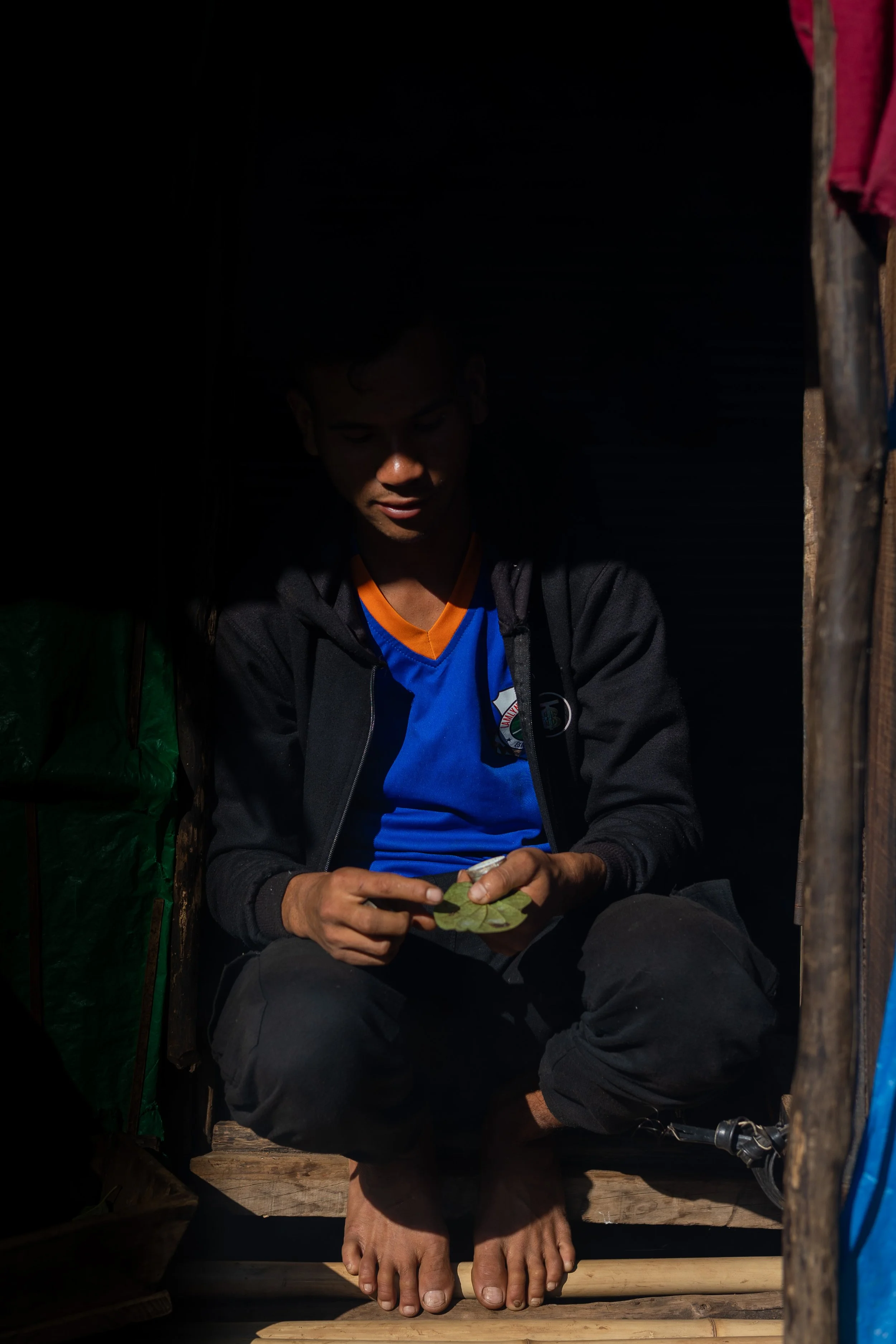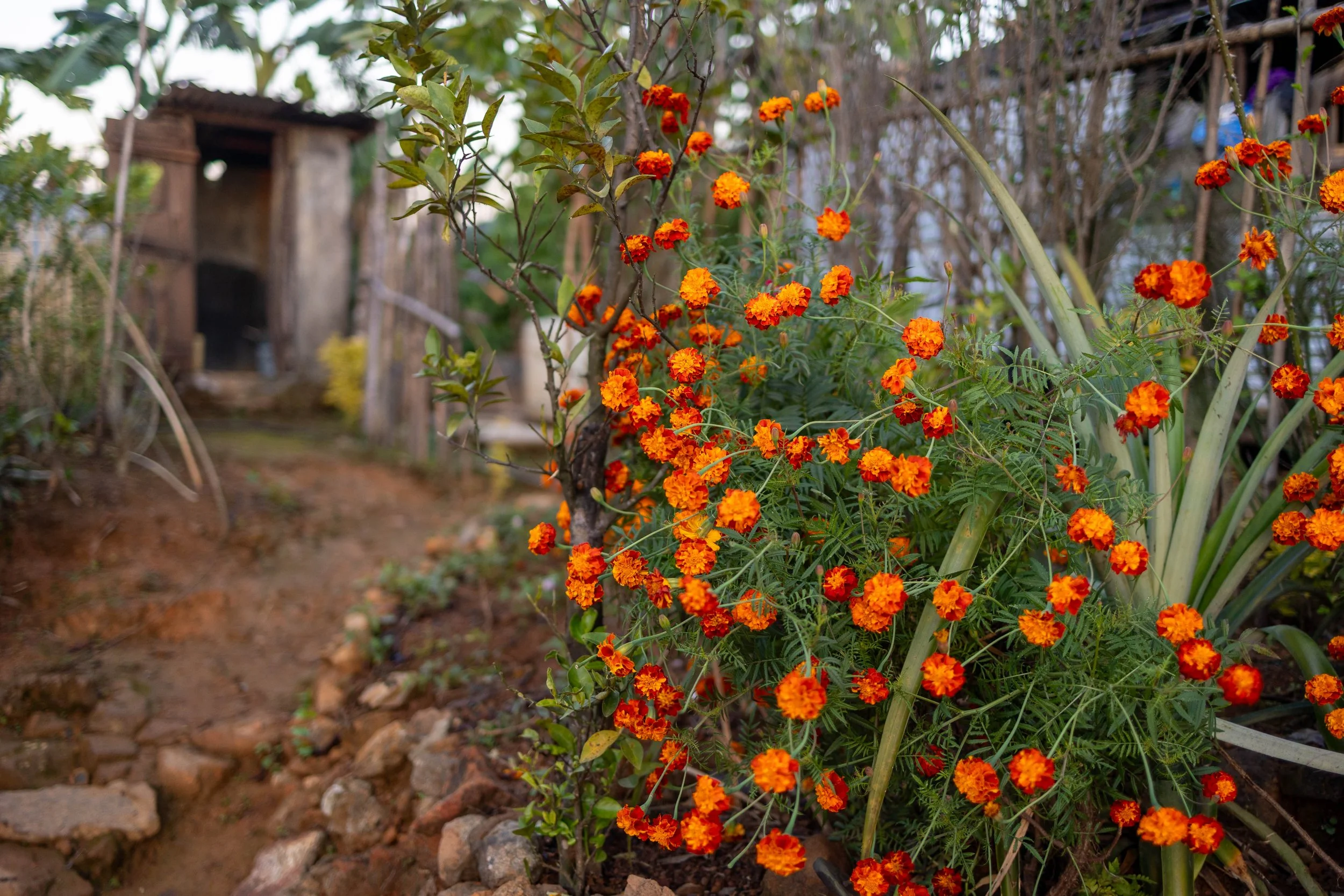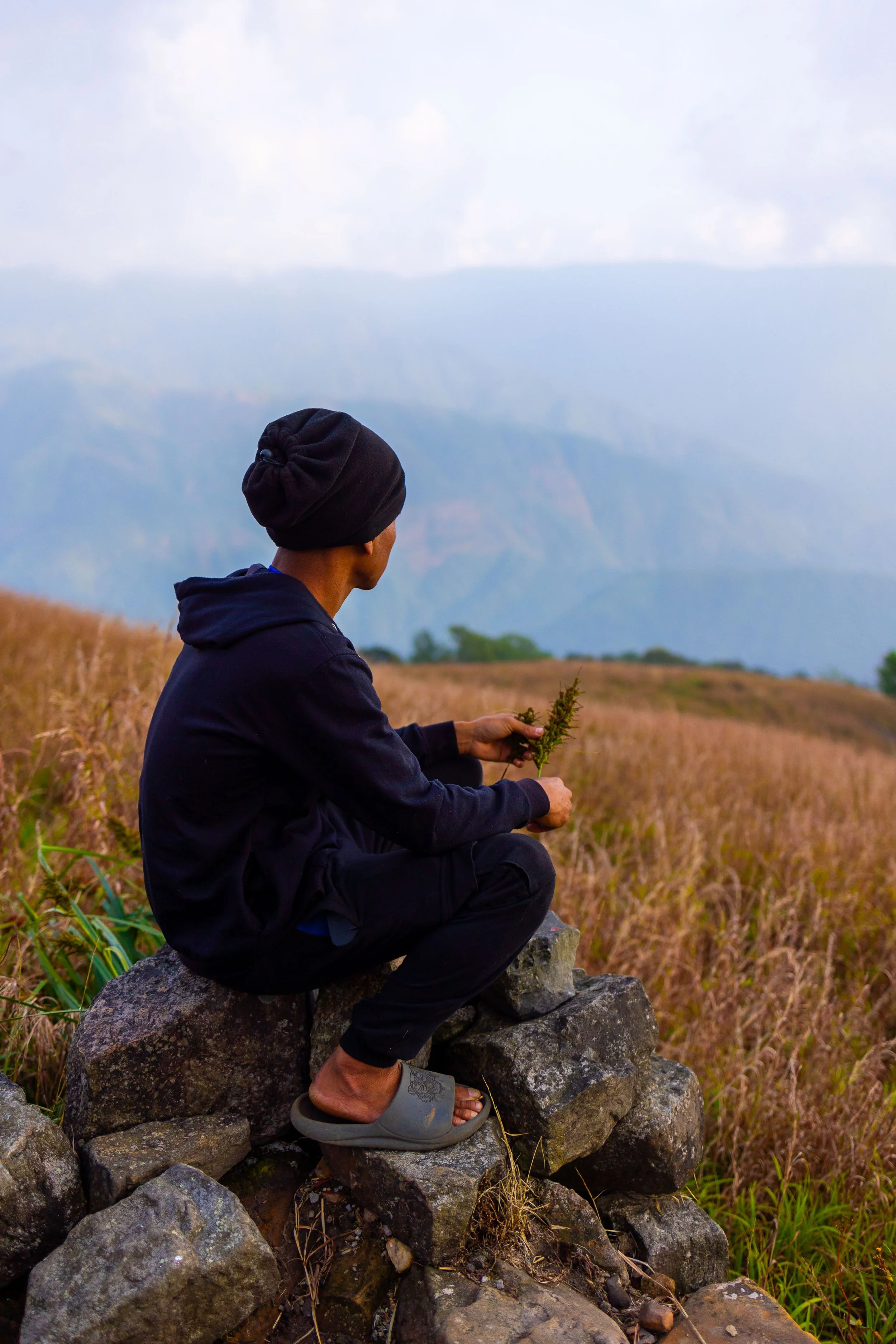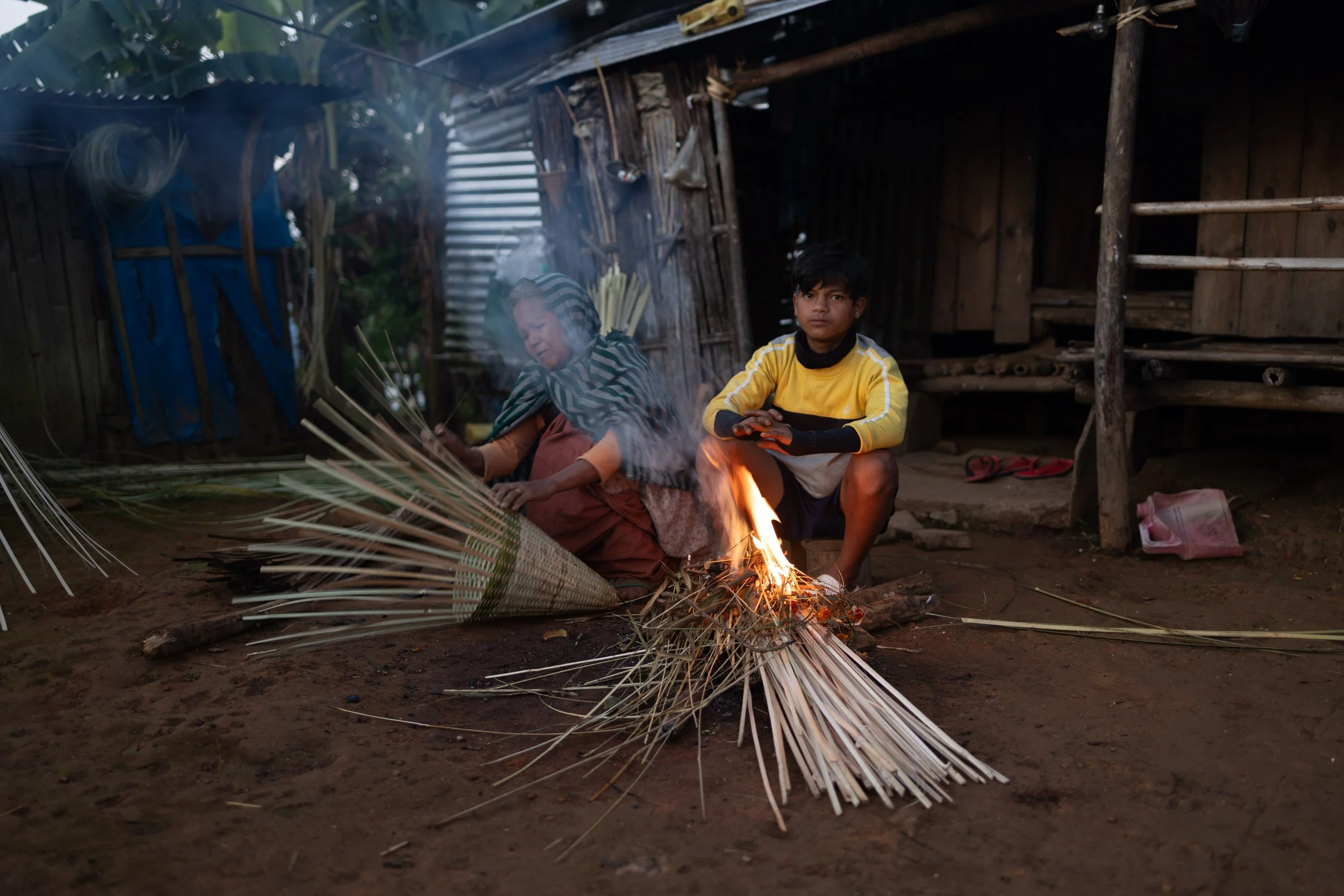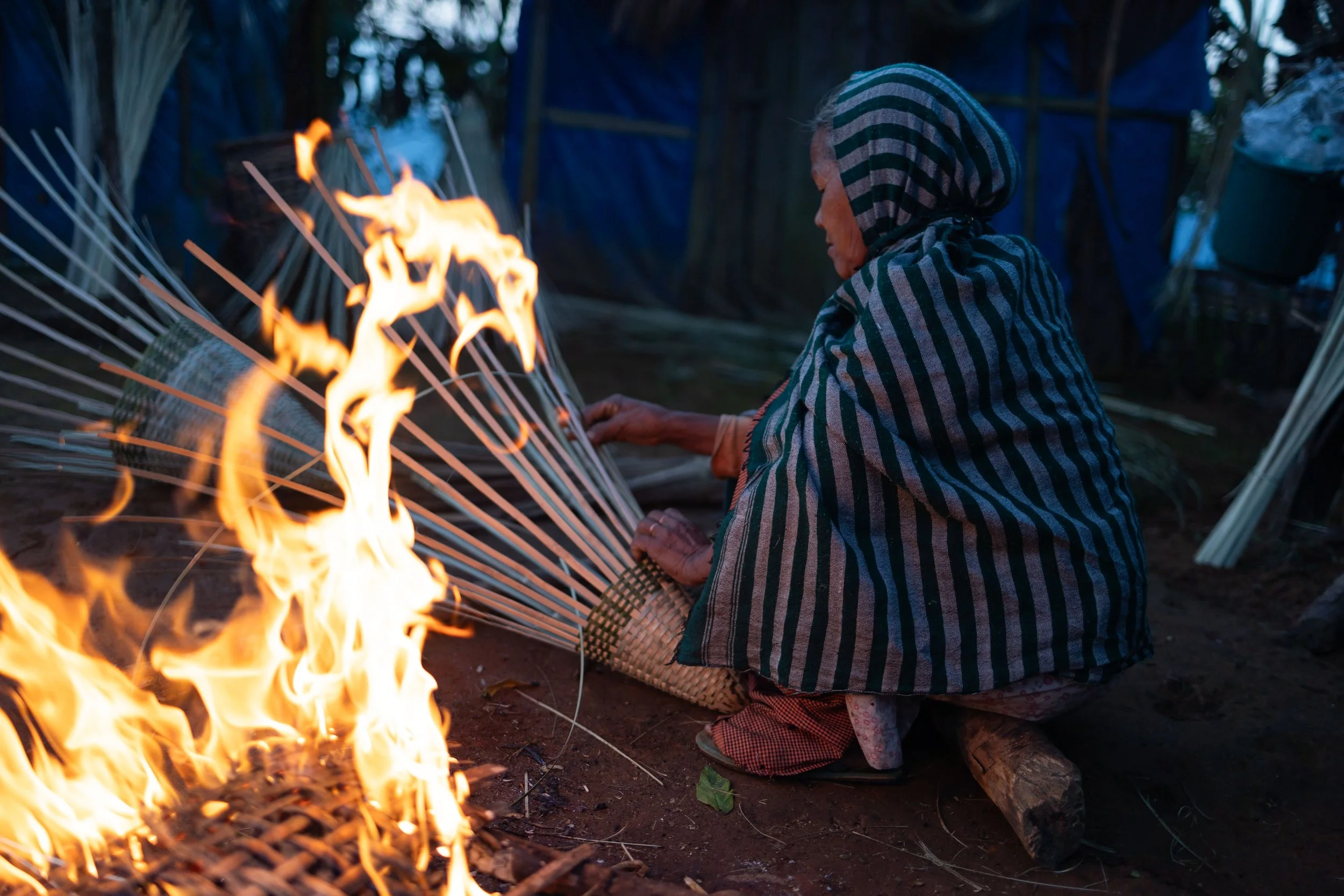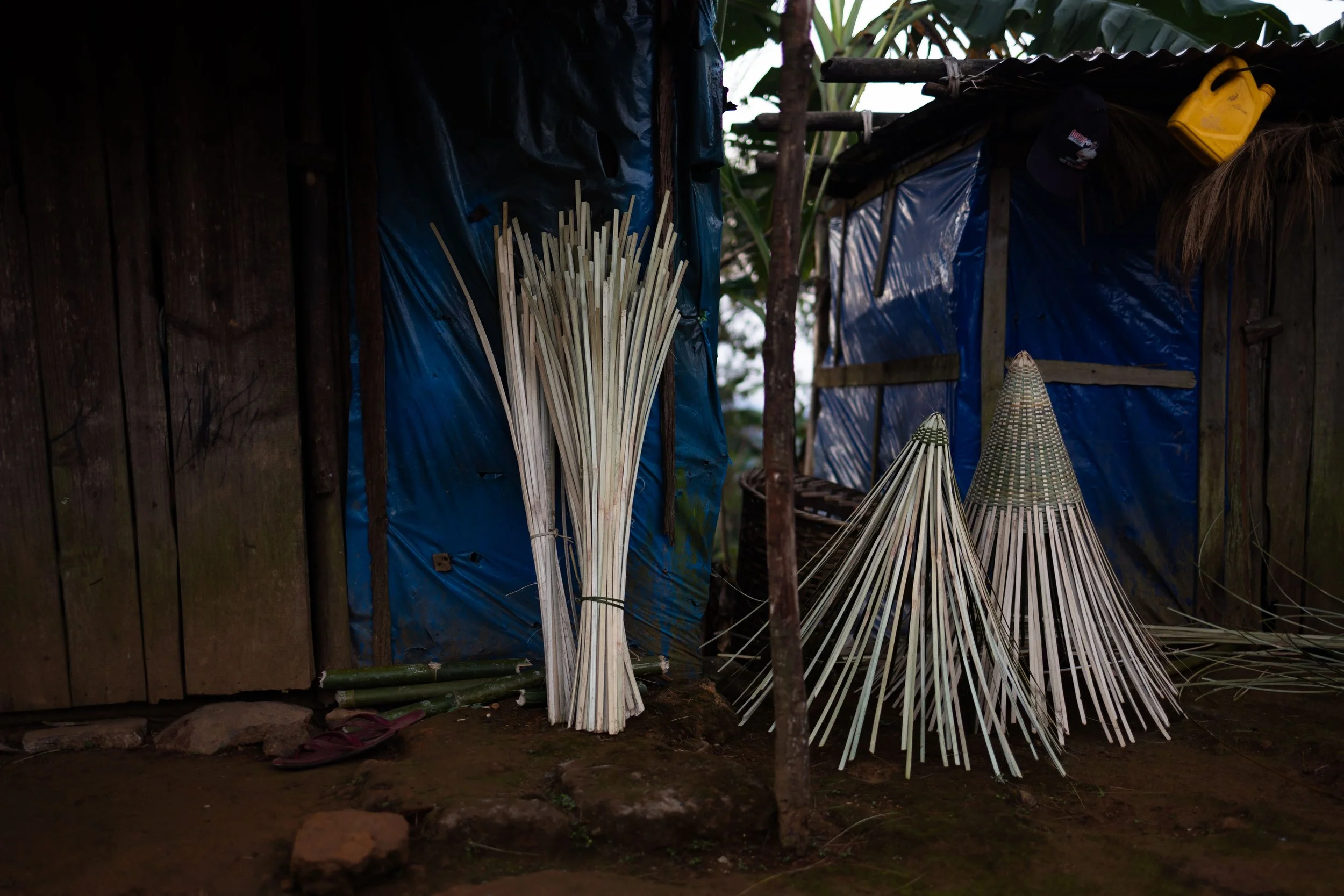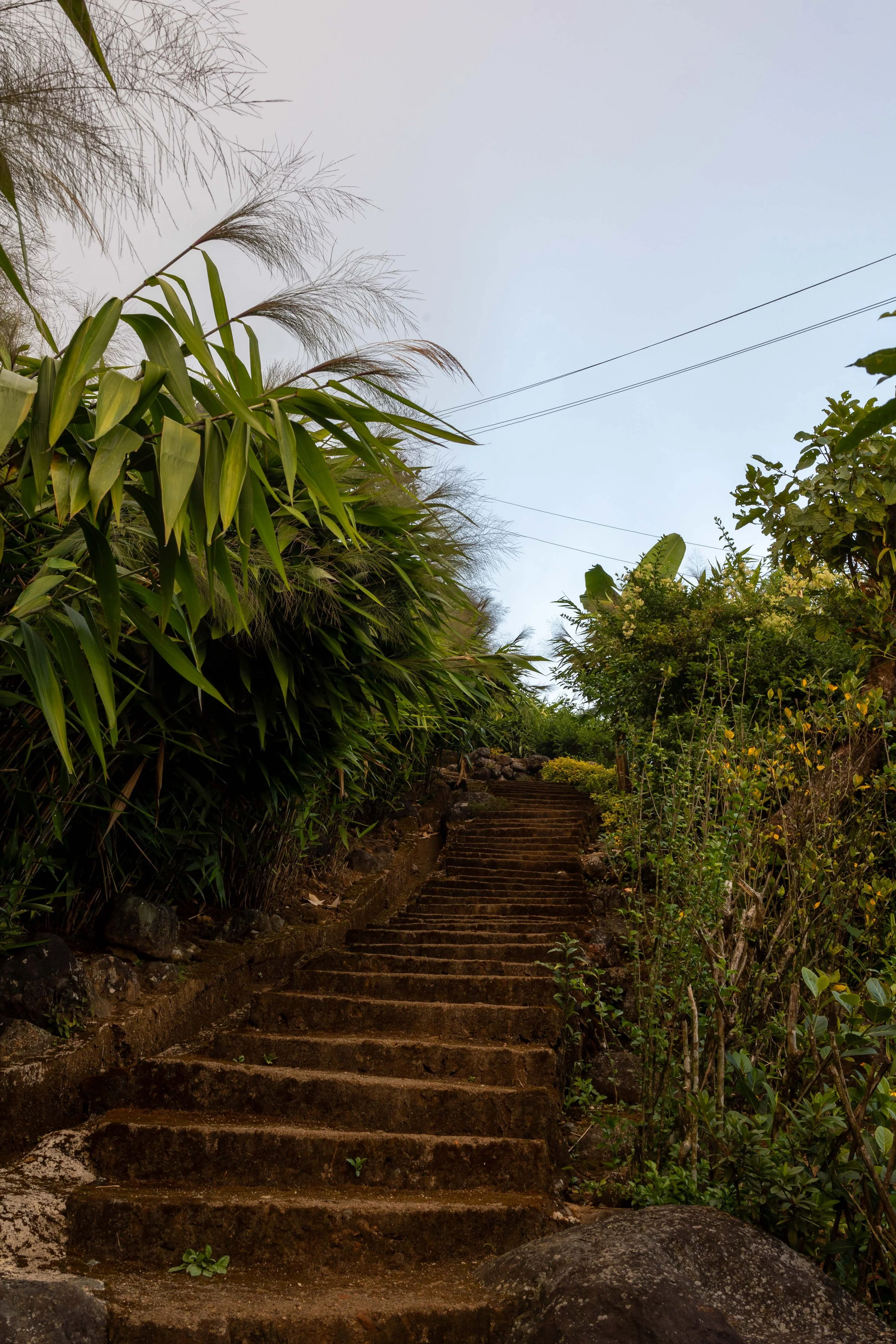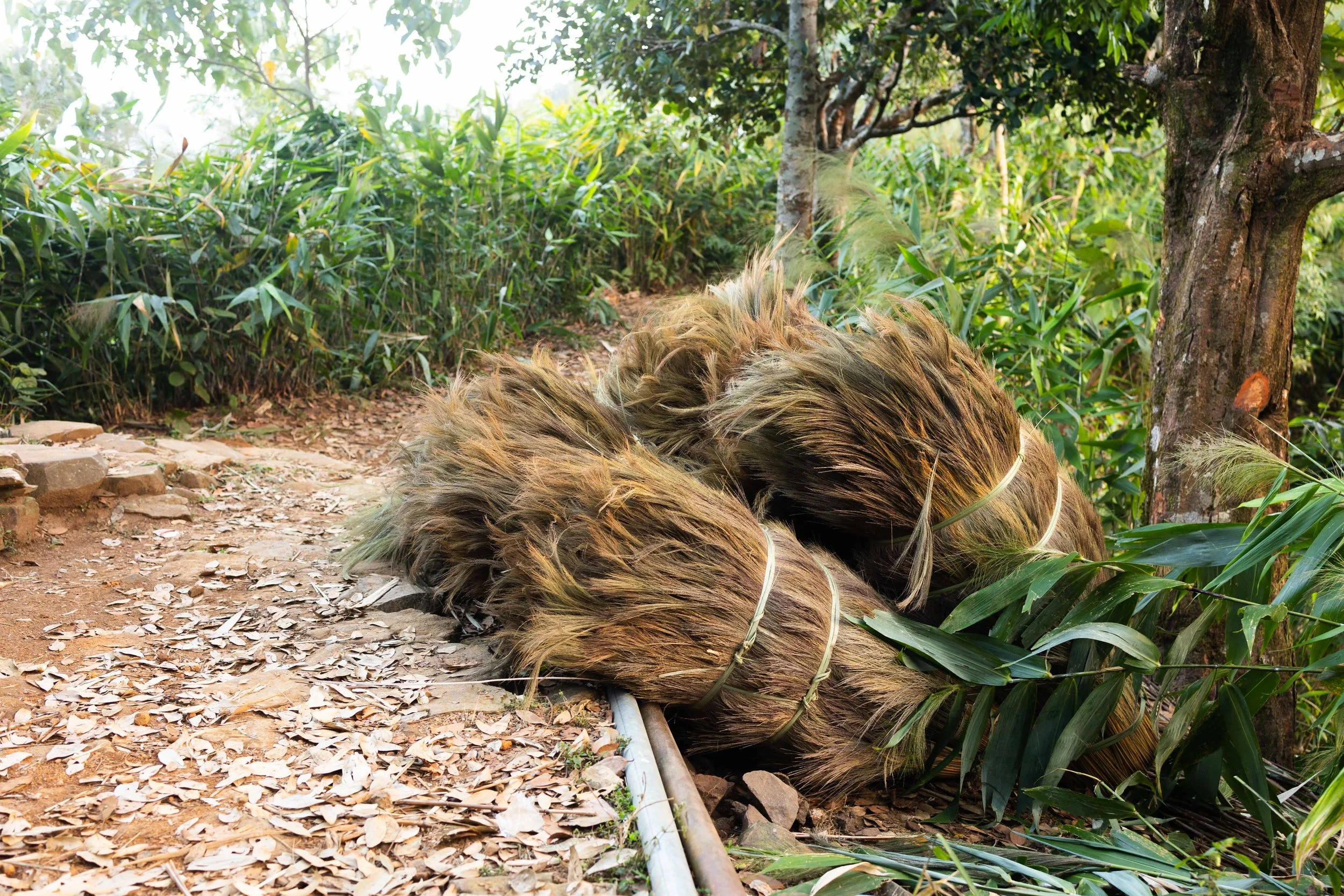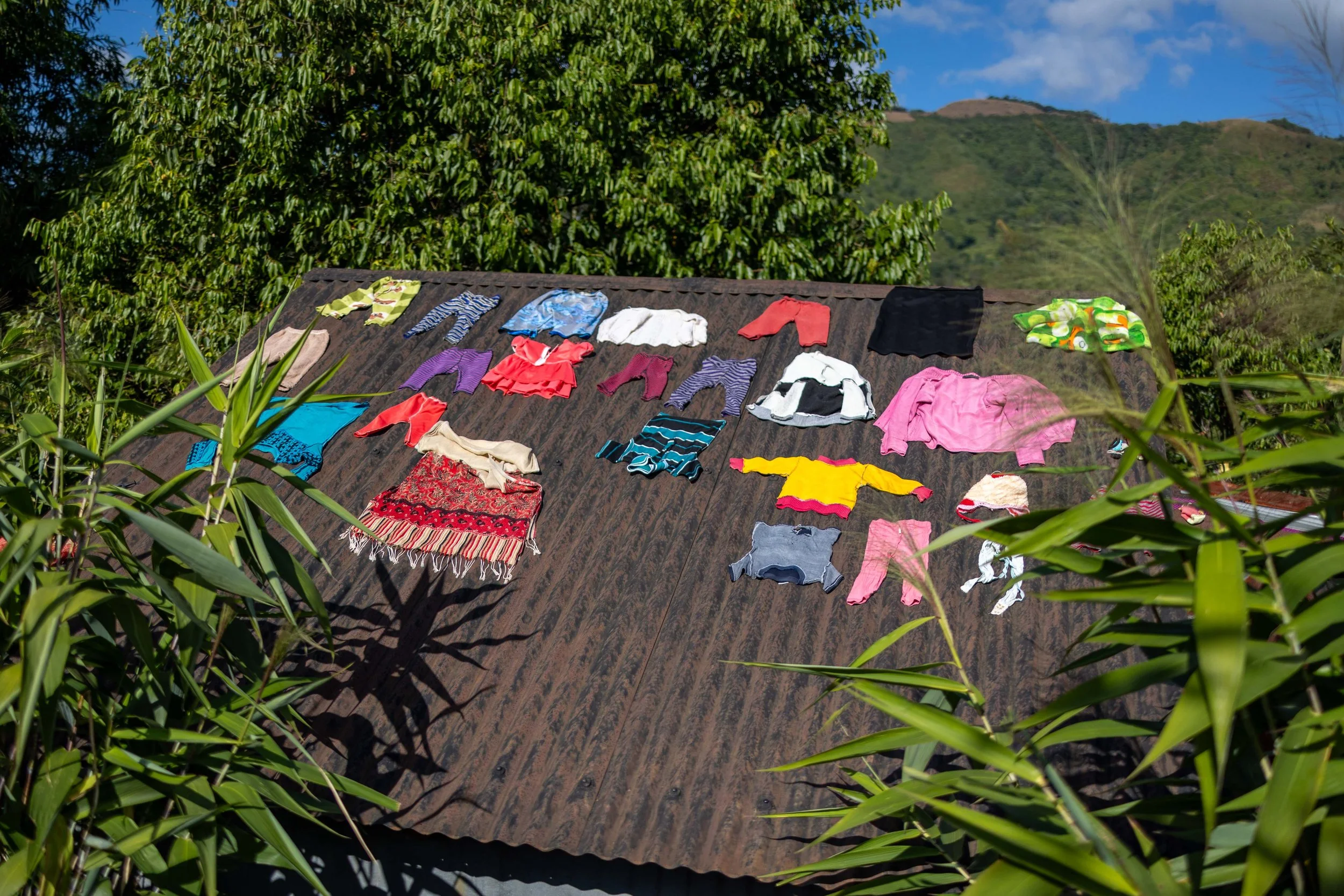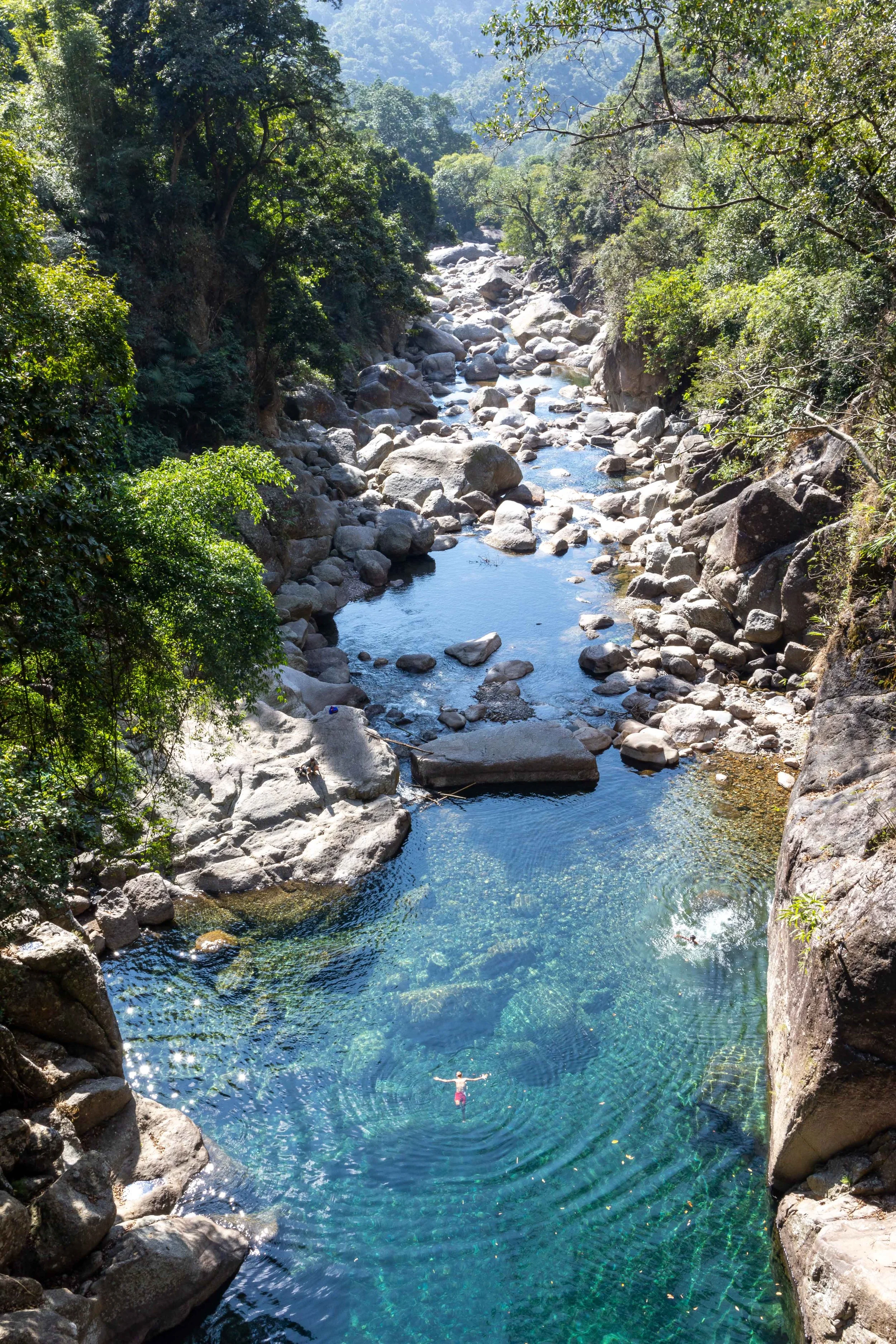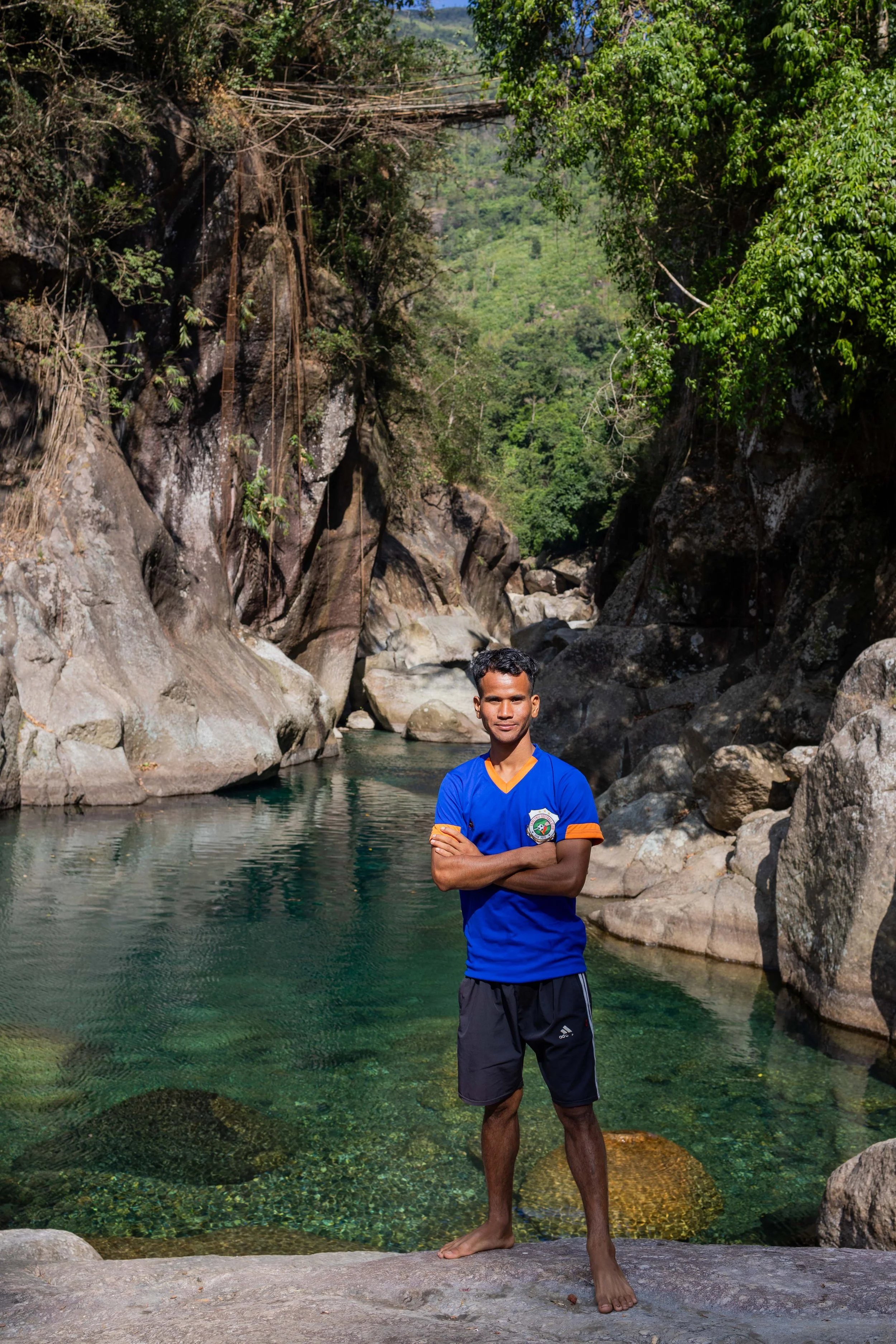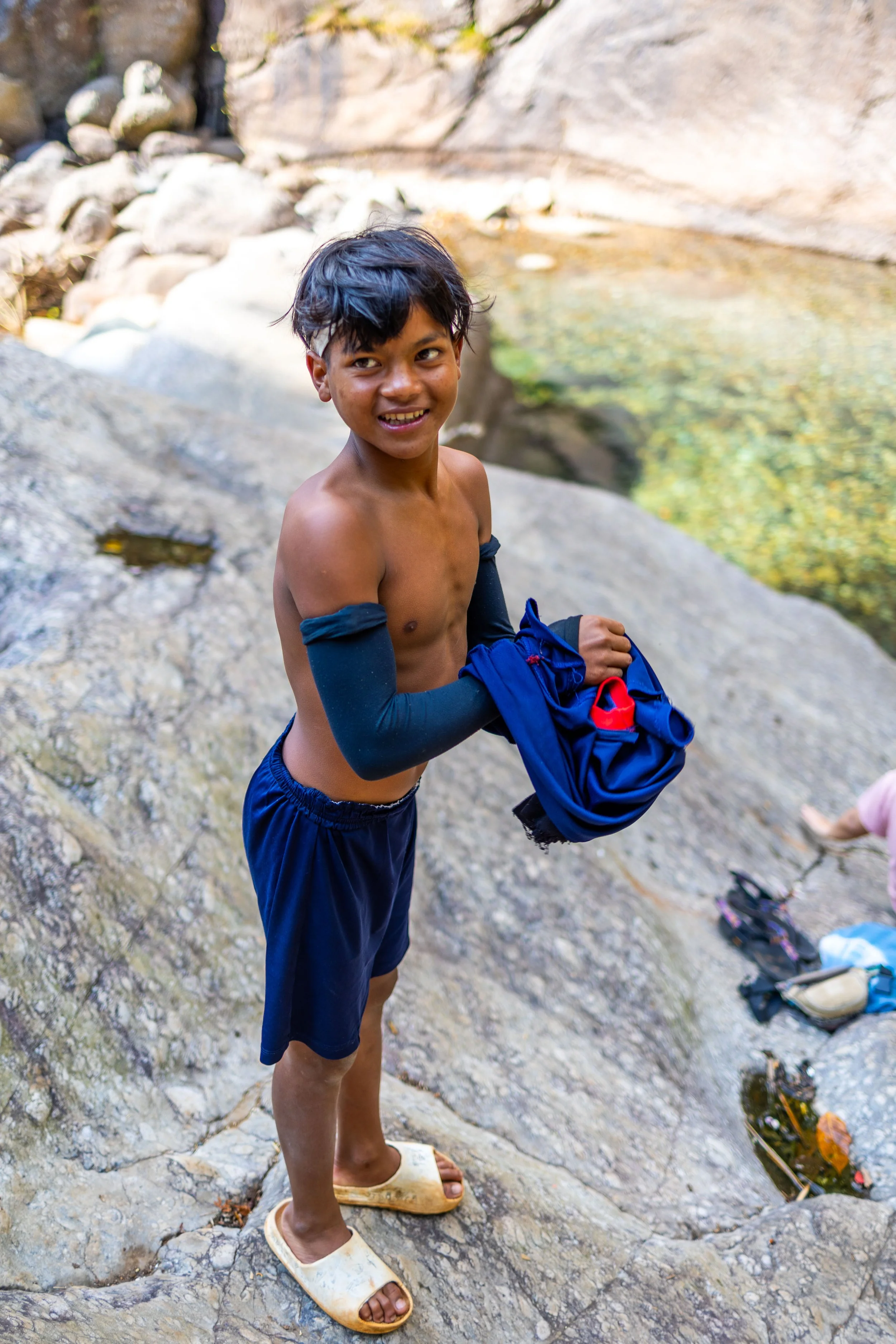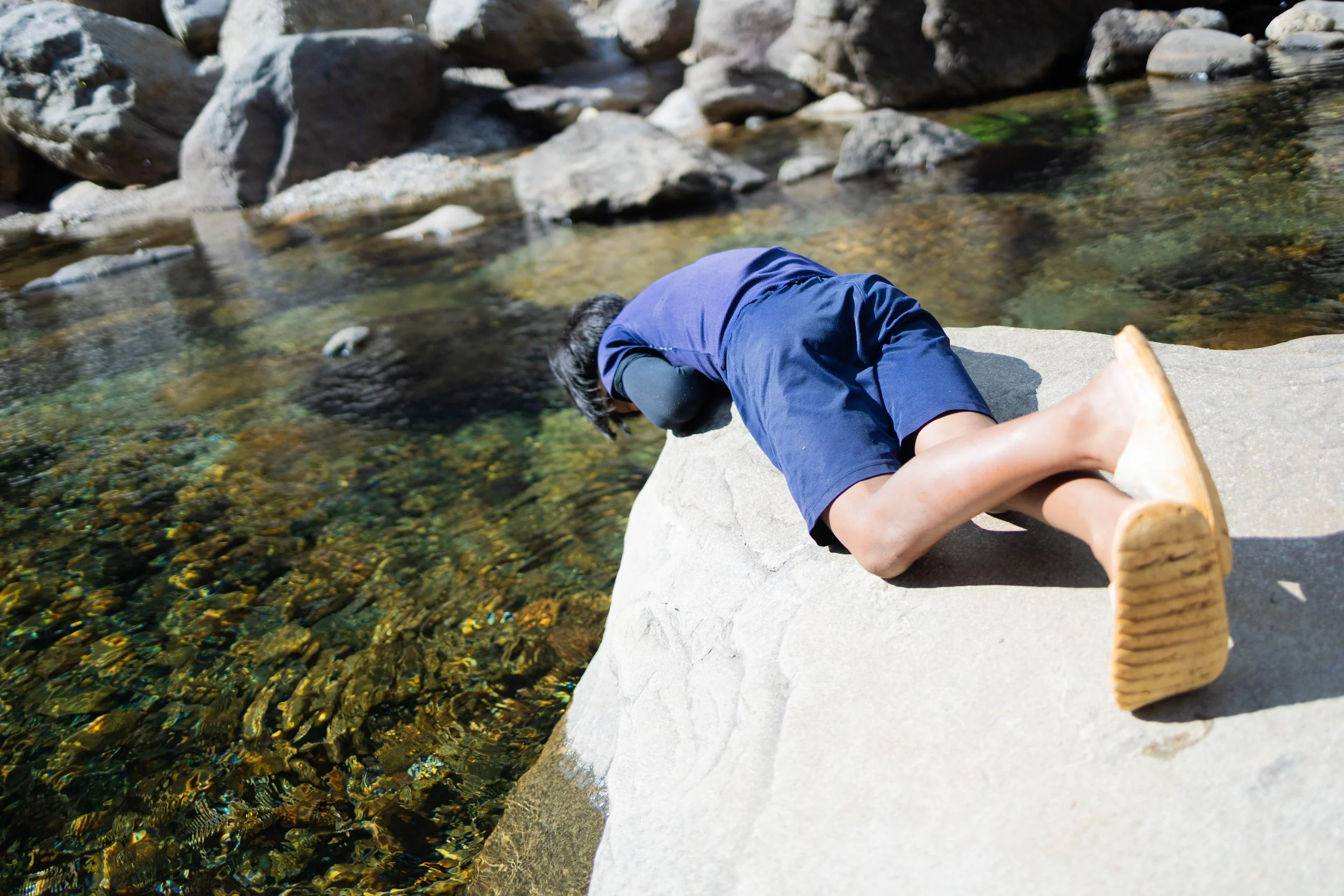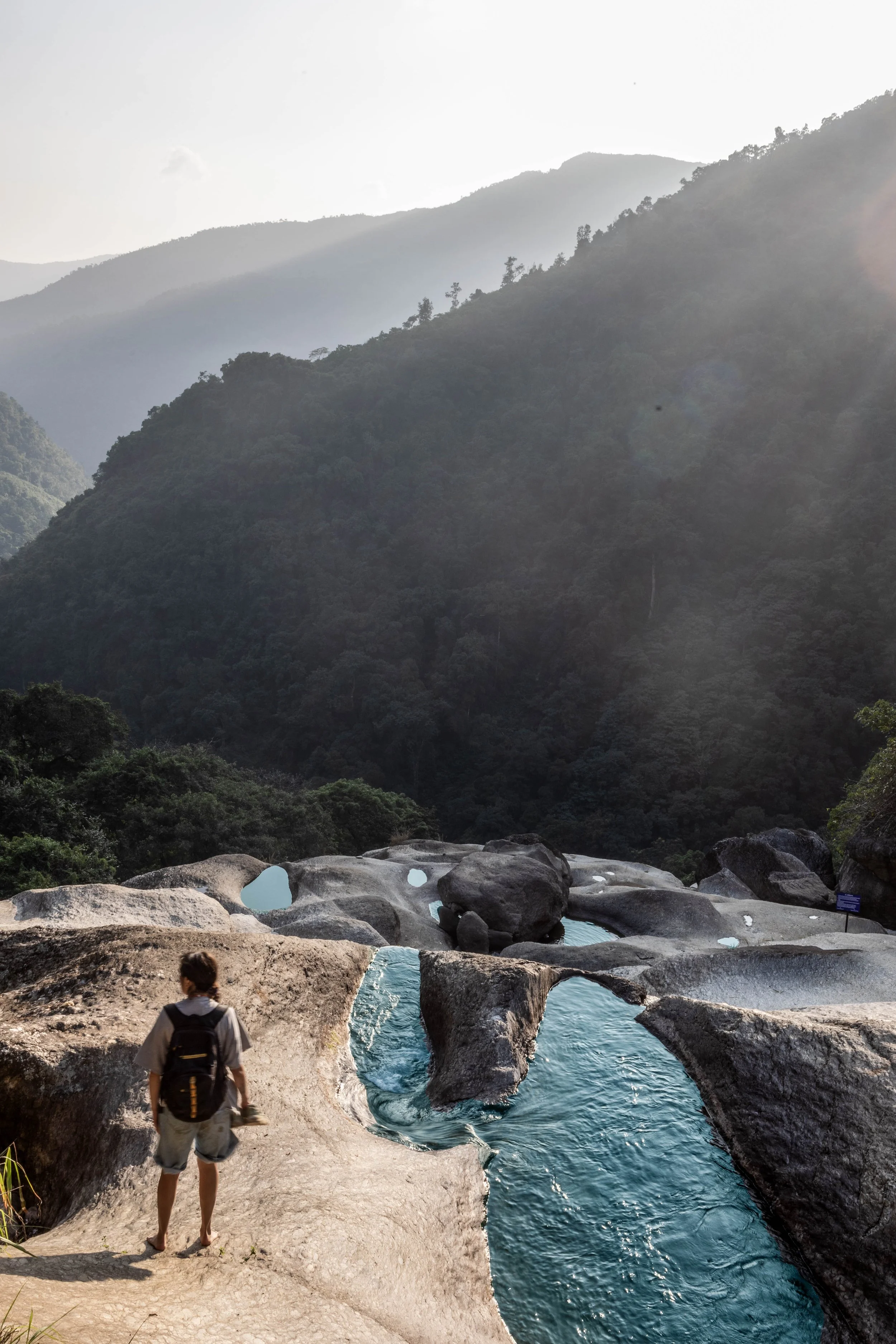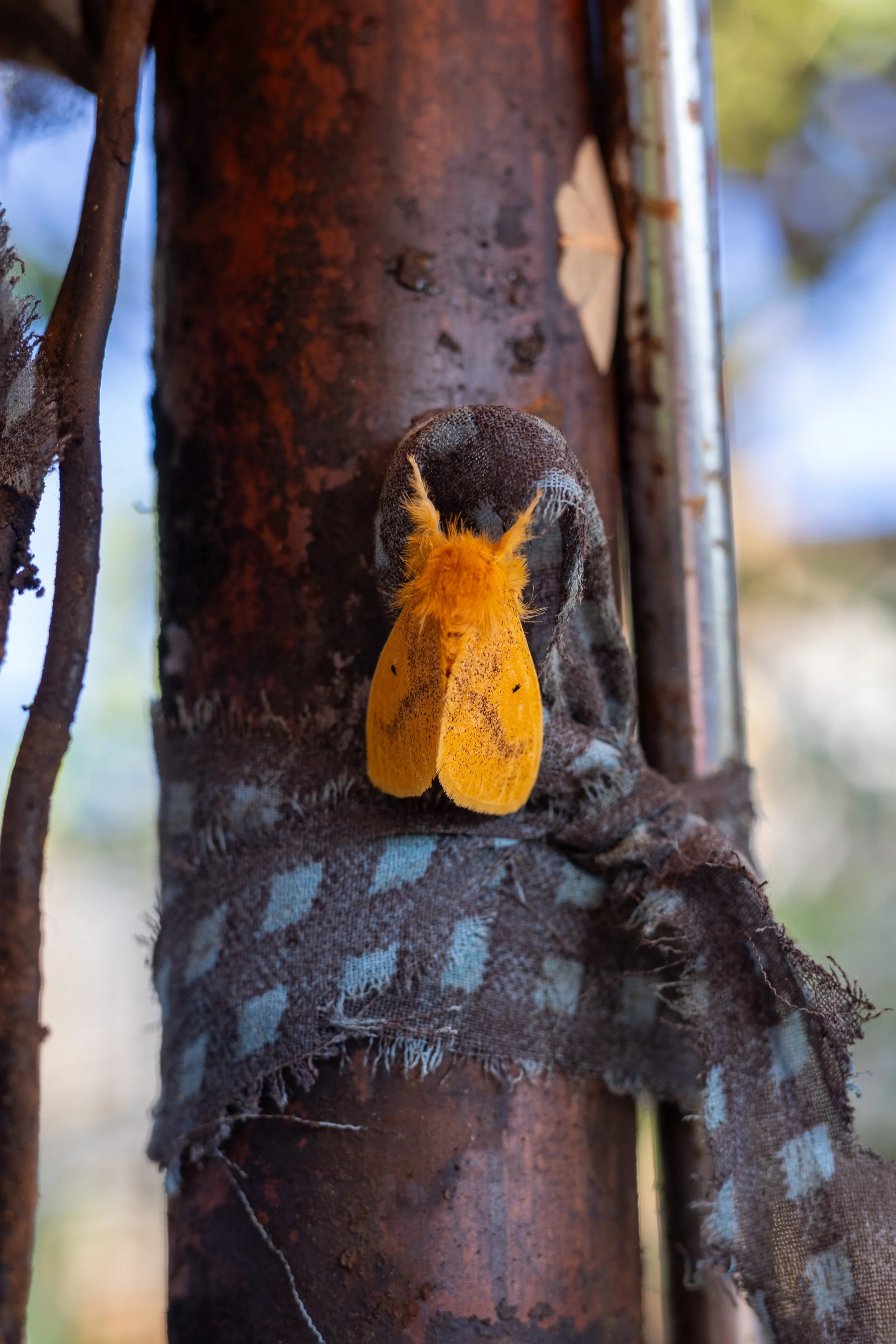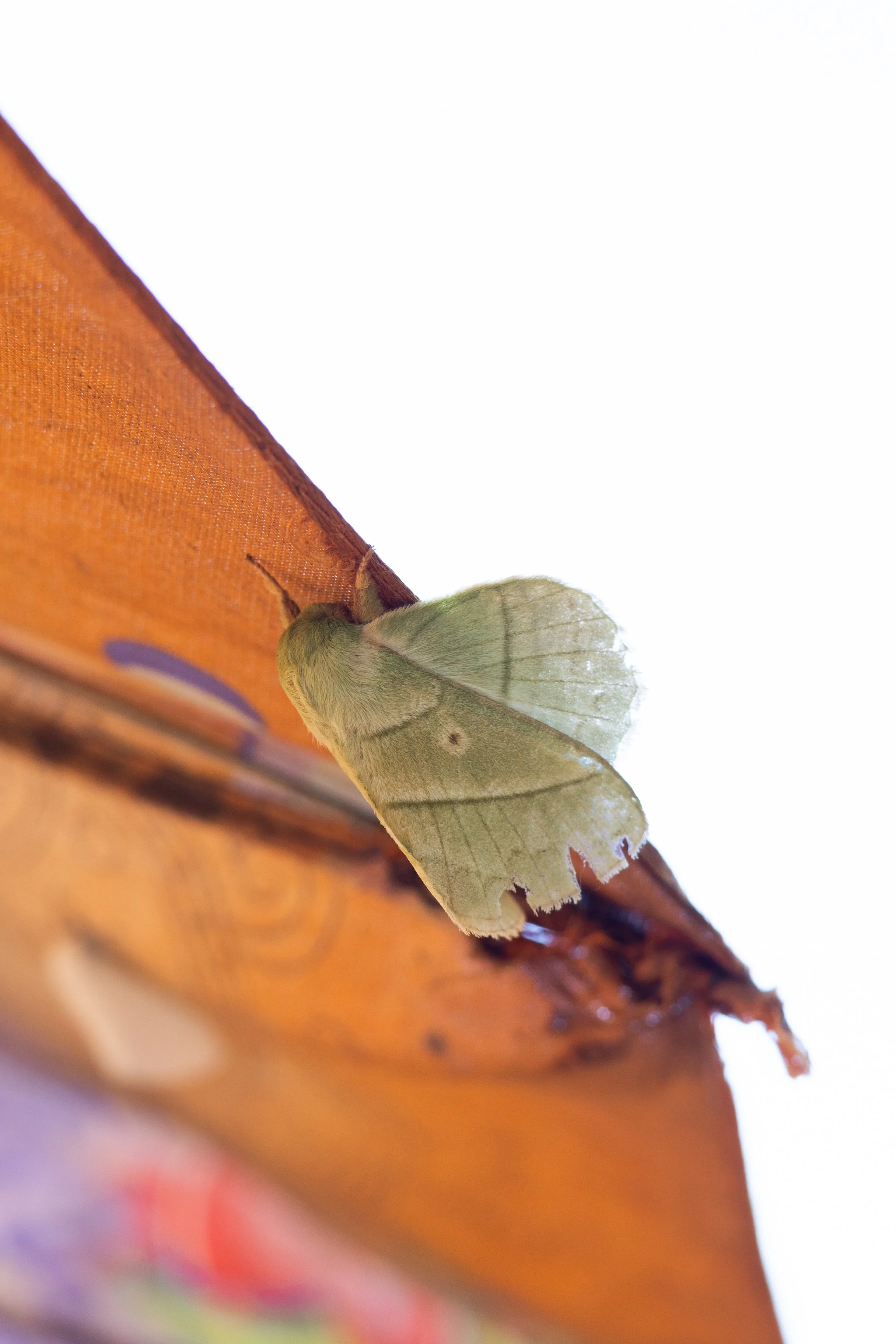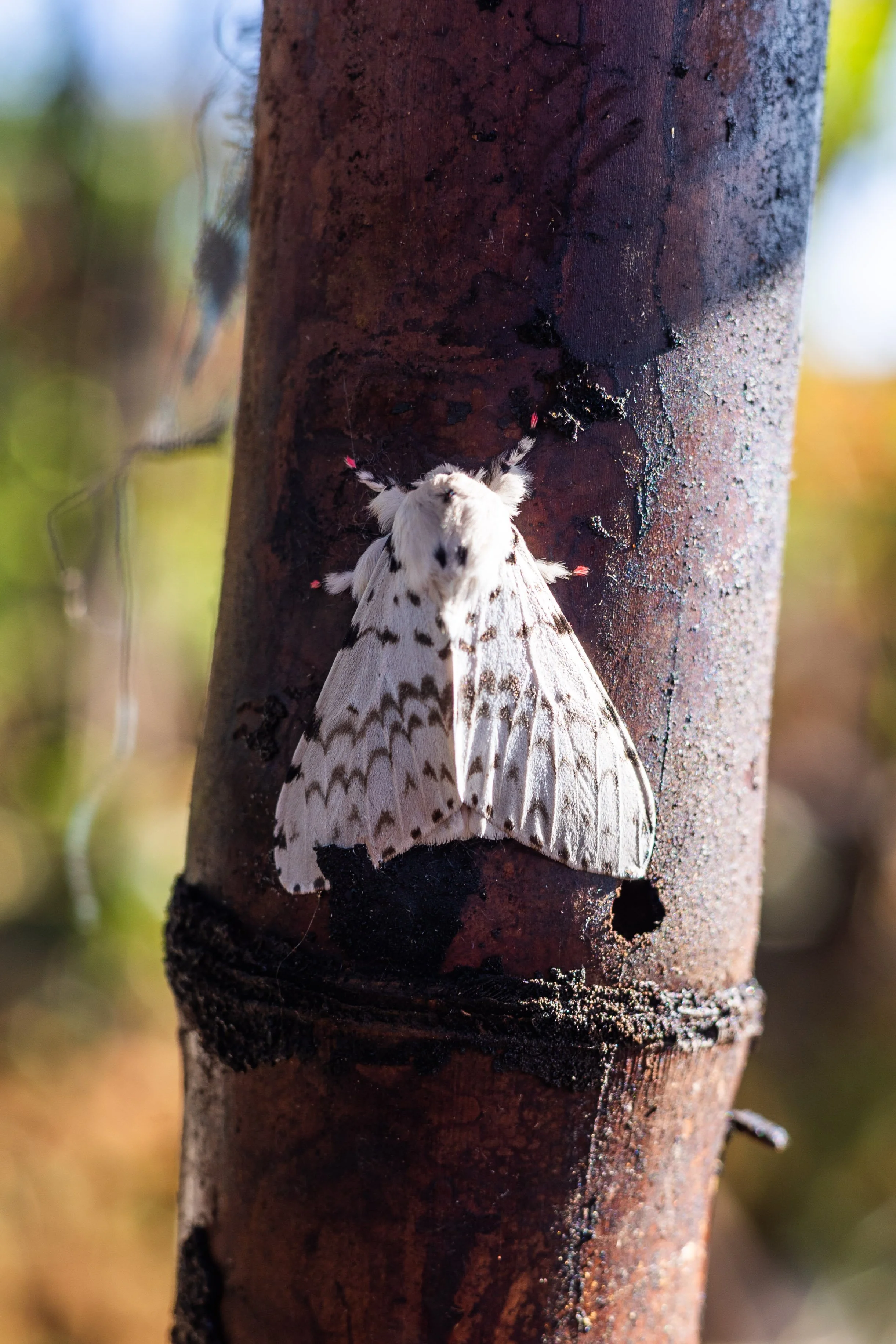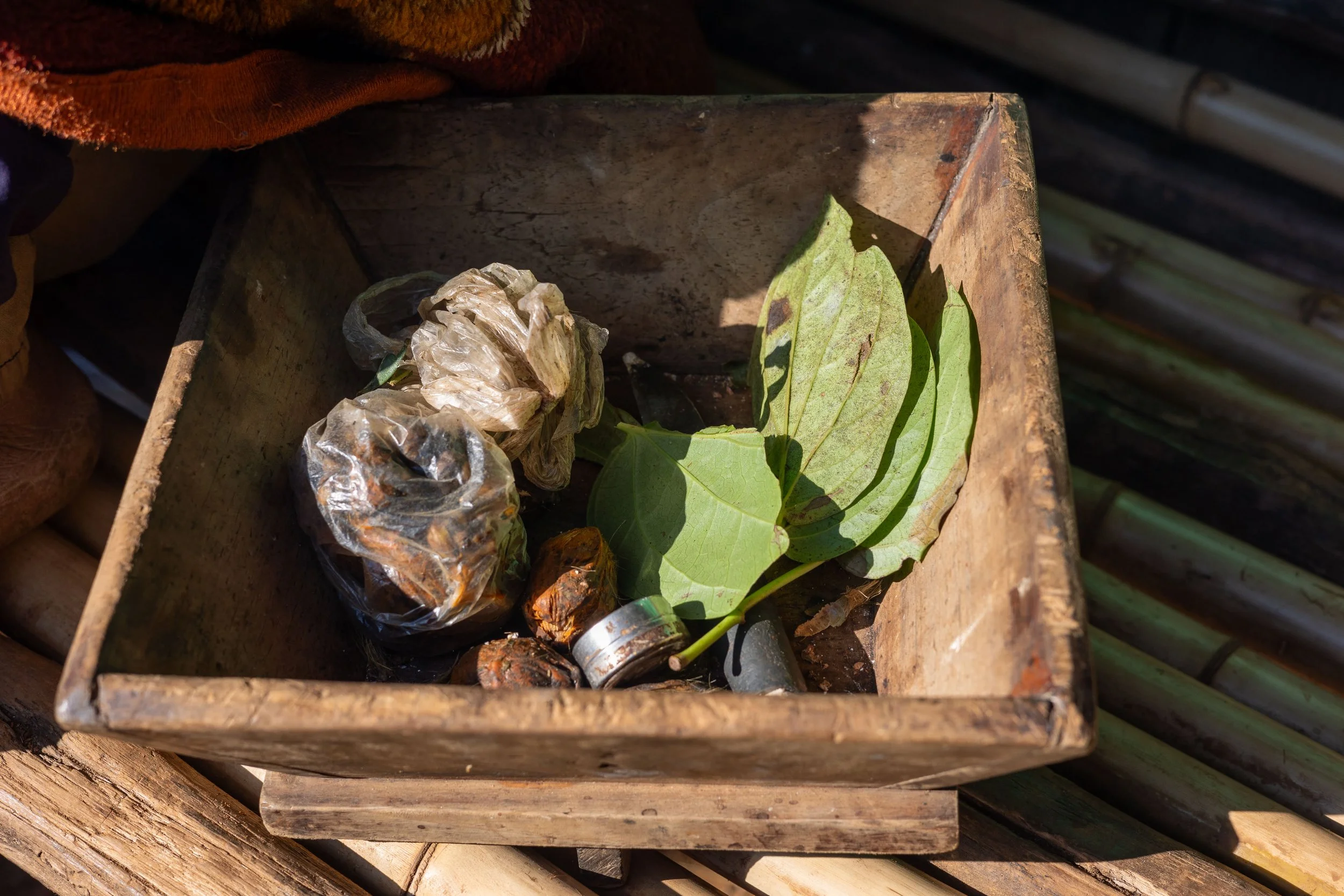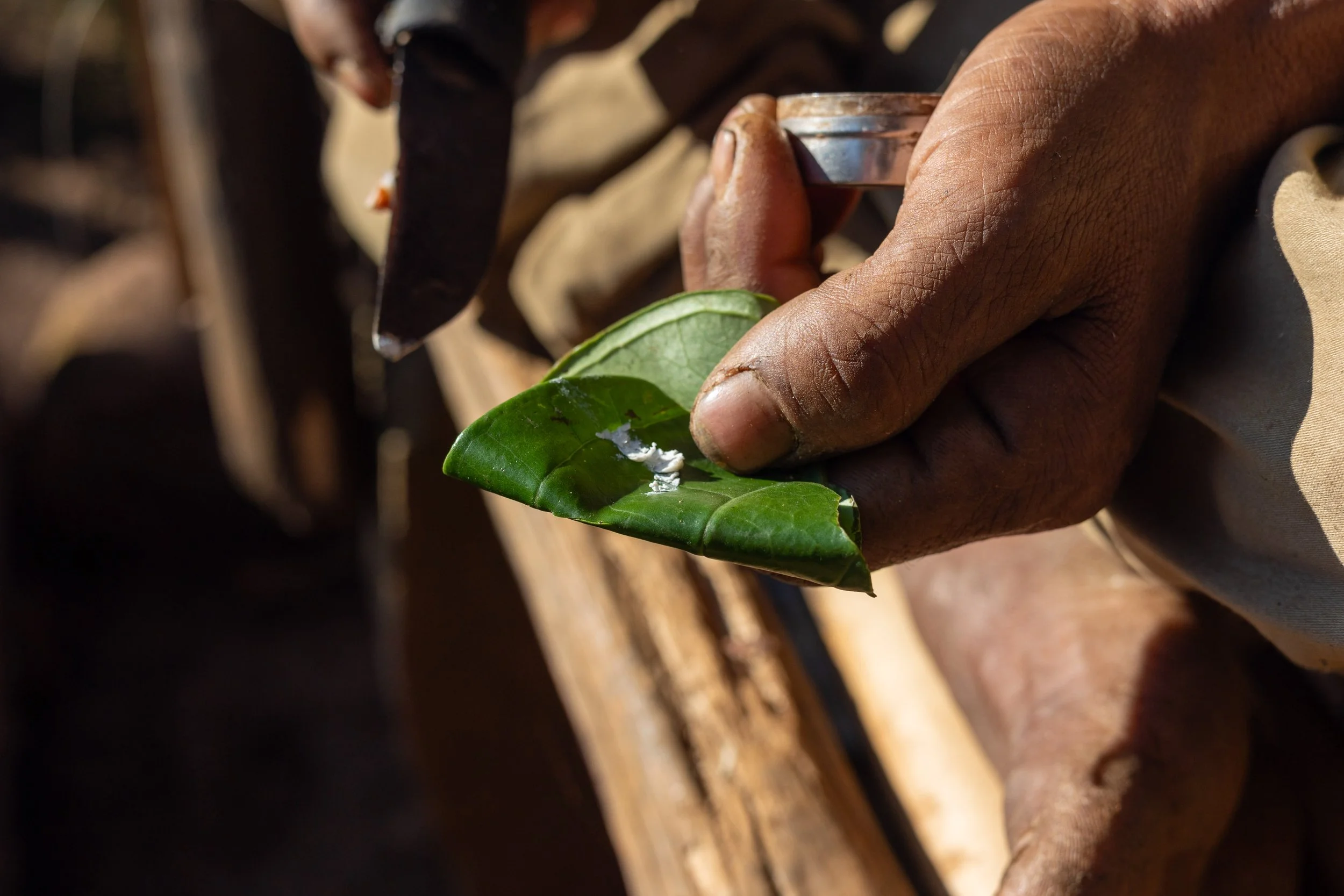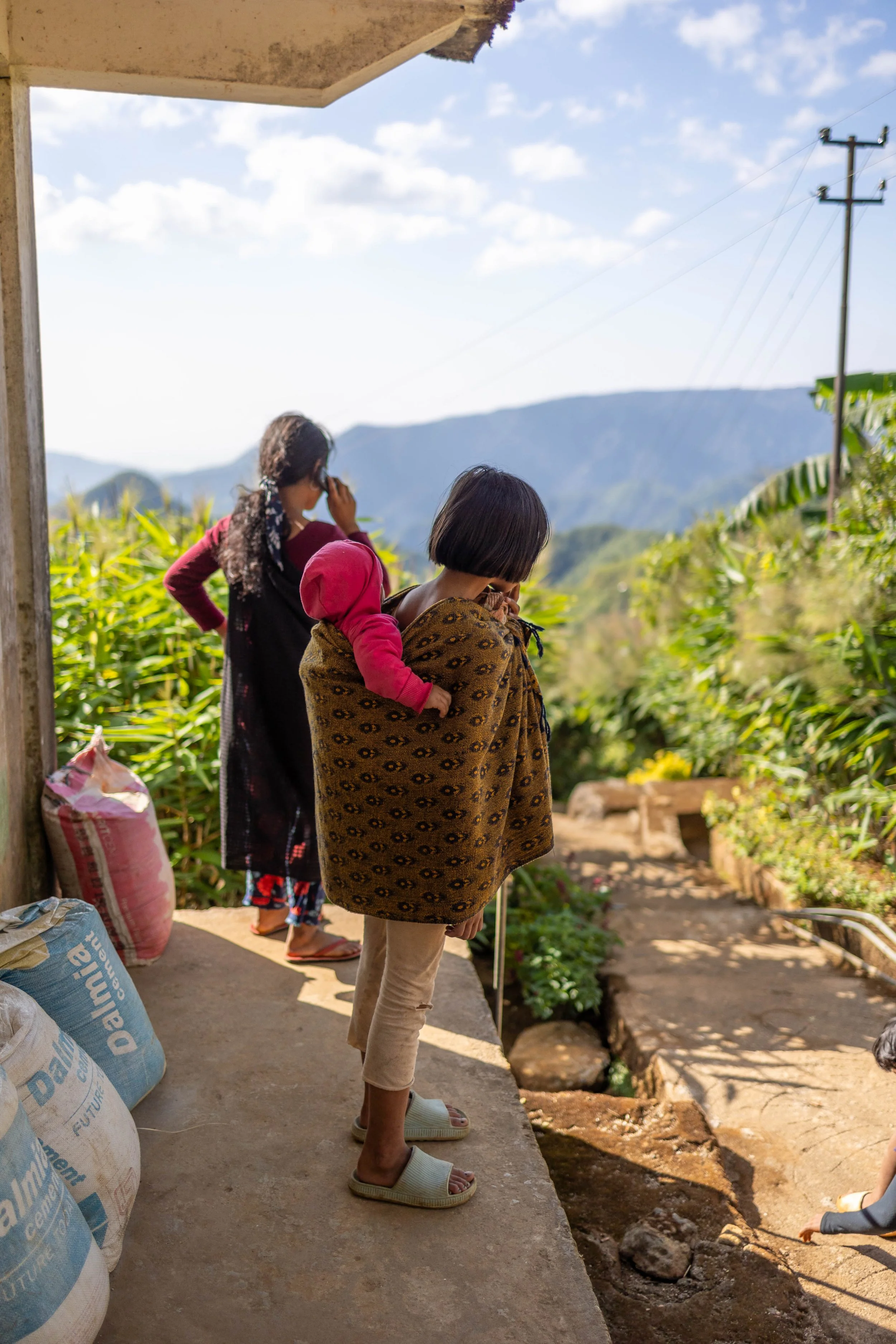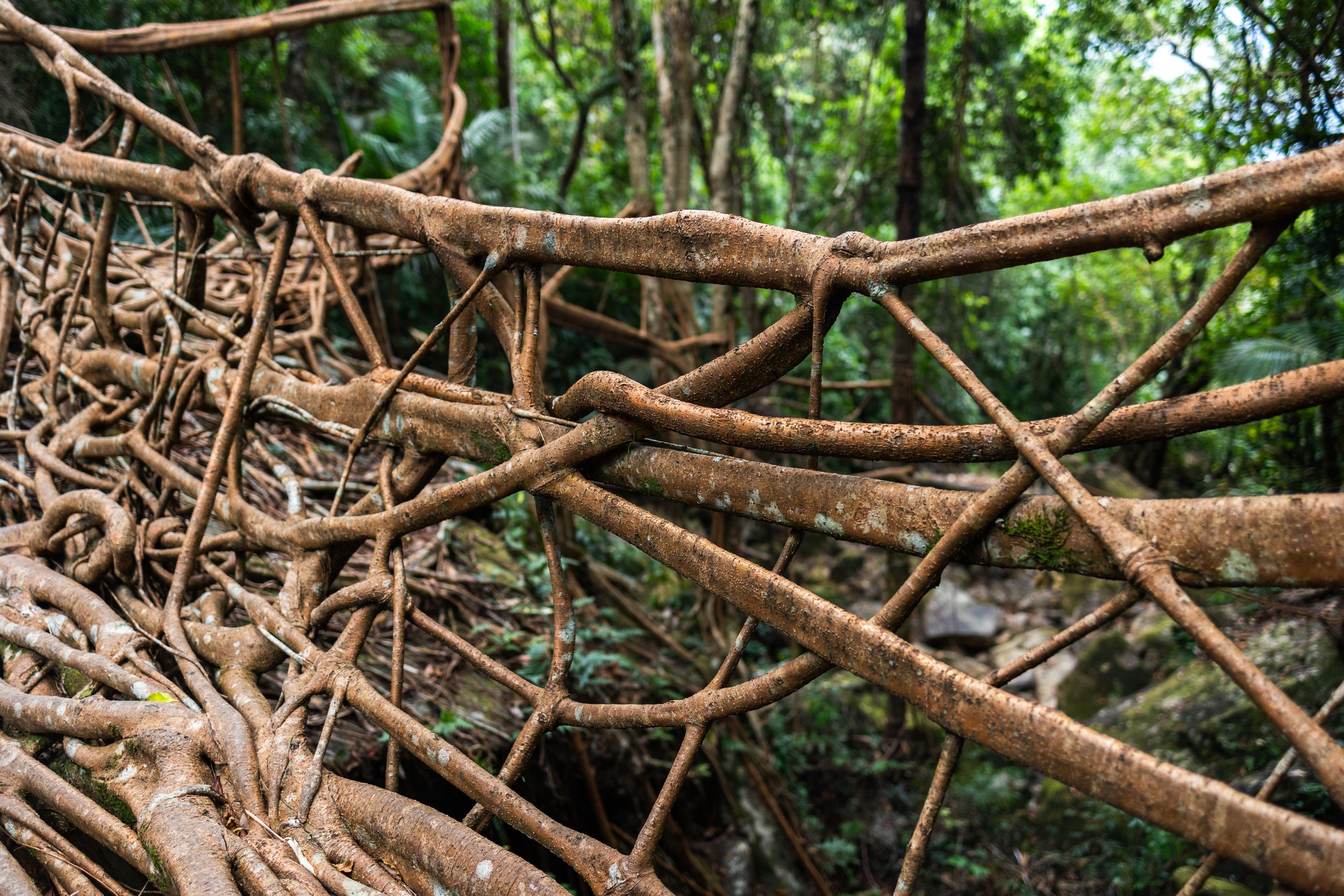The Singing Village
Meghalaya - December 2023
For this article, I would like to take you on an auditory as well as visual journey, as pictures alone wouldn’t do this story justice. So plug in your ear buds and click up the volume as this page has been scattered with play buttons.
The story begins with a local friend, Tishu. During my hunt for the Living Root Bridges Tishu invited me to stay with his incredibly generous family in Krohiawhiar, a picturesque village of just twenty houses, perched in valley in Meghalaya. One of the many things that made my time so unforgettable was that the small cluster of villages in which Tishu lives have a very special and magical tradition unlike no other…
Tishu, sitting on his porch
Heading towards the village on my 125cc scooter, sharp switchbacks and breathtaking scenery carries me like a roller coaster through quaint hillside villages, swooping past children playing in the roads and people washing clothes at communal washing stations. The track peeters out just shy of the village, where I park my scooter and finish the journey on foot, a short walk on a leafy banked footpath which leads me into the village. I am greeted by Tishu and many smiling faces peering over bamboo garden fences and out of beautifully maintained adobe houses nestled amongst banana leaves and electric orange marigolds. After some warm introductions to Tishu’s immediate family and a quick tour of the village, it’s not long before you begin to hear the unique sounds of this community.
After a hot cup of cha doo (black tea), we head off to the top of the hill to watch the sunset. The single path that cuts through the village turns into dense fields of Tiger Grass with it’s big fluffy seed heads, ten foot tall, bobbing in the wind. The grassy tunnel ends, spitting us out onto a vast golden meadow with 360º panoramic views of the mountains around us. We perch on some rocks, and let the warm mountain air buff our faces as cicadas begin to switch on, one by one, with their mechanical chatter. Here conversation naturally turns to the musical side to his village life.
Tishu looks out over his beautiful kingdom
Tishu explains when you are born (or sometime shortly after) - as well as being given a first name, your mother will also compose a unique melody or tune which you will keep with you for the rest of your life. This tune will become your primary name, used when greeting each other, and the spoken name very much becomes secondary. So here it is, first up, Tishu’s tune…
Of course, long tunes can also be abbreviated down into a small section for quick calling, a bit like a nickname. He uses the end of his tune with the rise at the end as his nickname.
Back the base and it’s time for kana (dinner). Rice, daal and veg, all grown from the garden and a couple of boiled eggs from the chickens.
India has a single time-zone across its 3000kms of latitude, which means for this team in the East, the sun sets at 5:30pm (in Mumbai it’s almost 7pm). The people here have a deeprooted relationship with nature and a part of this, is moving with the sun and so bed-time is not long after dark. Tishu’s little brother, Hero, shows off his cosy sleeping quarters. He’s built a tiny hut on stilts in his back garden like a treehouse, which him and his mates can sleep in when the nights are clement. He gives us a rendition of his full tune before we all hit the hay:
Tishu’s little brother, Hero, and cousin.
With an early night comes an early start; a dawn chorus at 4:30am. Here in Krohiawhiar, however, it’s not just the birds singing, it’s the people too. Everyone greets each other in the morning, by checking in with their gentle tunes which melt seamlessly into the sounds of nature. I find Tishu’s auntie and nephew weaving baskets around a fire as the sun rises.
The village has two main streams of income. One of which is ‘Doko’ making - a very skilled task of peeling bamboo canes into pliable strips and dexterously weaving them into large cone shaped baskets. They are extremely sturdy, completely natural and are used for carrying anything from fruit to building materials. The locals can peel the skin from the bamboo canes in seconds with a knife, creating huge lengths of flexible material to work with. Easier said than done - I tried to have a go and made a complete meal out of it, only managing to create kindling, short chunks destined only for the fire. Best leave it to the experts…
The second stream of income comes from the fluffy seed heads of the vast Tiger grass fields surrounding the village we walked through earlier. Once the bushy heads have reached maturity, they are harvested in large bales, which can be conveniently slotted into the Doko baskets for carrying home. No knives required here, the seed heads simply ‘unplug’ from the stem of the plant with a sharp tug. Back at home a handful of these heads are tied together create very effective fluffy brooms. Both the baskets and brooms are sold at the market for a good price and income for the village.
During the cultivation and harvest is where the name songs can really come into their own. Imagine being out on the mountain, miles from home, and you want to check in on family or friends. Simply crank up the volume or whistle and use the landscape as an acoustic amplifier to send out your friends’ call sign.
Here’s Tishu whistling for his brother Hero across the village, but using the short ‘nickname’ version of his tune. Hero uses the starting part of his tune:
After Tishu and his mum finish serving up a delicious omelette breakfast, Tishu’s tour of his Kingdom begins. A huge two hour descent into the belly of his valley to reach the highest living root bridge in Meghalaya. Strung 60m in the air, straddling a narrowing of the gorge, it’s a picture postcard sight set above a crystal clear pools below. Time for a swim. Tishu’s already in before I’ve managed to get down from the bridge. Diving into the freezing mountain water disturbs the snoozing butterflies, triggering eruptions filling the skies like confetti bombs, before falling back to resume their tedious task of sunbathing on the rocks.
Drying off from the refreshing cool off, Tishu clearly had some more surprises up his sleeve as we head off further up the gorge. Tishu’s cousin, Phahborlang, leading the way. Kitted up in his finest jungle trekking equipment: football gear and white Gucci sliders, effortlessly bounding from rock to rock, and the occasional Tarzan swing from a hanging vine.
After an hour or so clambering up the rocky gorge. An enormous geological marvel presents itself. A 200m high staircase of turquoise plunge-pools scalloped from a vast sloping boulder as if done by a mythical giant weilding an ice cream scoop. Each pool elegantly fills the one below with a swooping waterslide or waterfall. Tishu had carried a delicious thali lunch, so we ate and sunbathed, basking on the warm granite, angled at a perfect gradient towards the sun.
Sadly, with the sun disappearing behind the mountains, at 3pm it was time to head off and begin the 2 hour ascent back up to the village. On our way, weaving through the flora I asked them if they’ve ever got lost in their jungle. They both looked at each other and sniggered as if I had just asked a Brit if they’ve ever got lost on the way to their local Tesco.
We arrived back at base just as the sunlight fades. Tishu’s family are home and chatting around the fire. You can’t move for all the aesthetic scenes - all of us cosied up in the hand-built wooden home, sitting on the smooth warm clay, fire flickering, flames glistening in the everyone’s huge pupils like sun through obsidian. The girls had even made some colourful headdresses from wild flowers, and I learn some more songs from the girls in Tishu’s family, and bonus guest, the secretary of the village who also paid a short visit…
Another warming meal around the fire before bed. After the 8 hour expedition, I tuck up into bed, and I’m out like a light.
Three moths perched around the house one morning
The morning breaks on my final day. Another early start surrounded by the sounds of village and nature. I find an array of colourful moths clinging to various things around the house, fluffly arms outstretched.
Sitting on the porch in the morning sun I ask about the box of goodies sitting on the step of the house. It’s Kwai. We all have vices, and this one is a natural stimulant, a bit like chewing tobacco.
The red ‘Kwai/Bettle Nut’ (Areca catechu) is chewed with ‘Lakor’ leaf (Piper betle) along with Lime as the abrasive.
It has many medicinal properties and benefits, including improving oral health when taken in moderation - but sadly this chewable snack is very tasty and addictive, which makes the moderation part tricky. Overuse causes a deep reddening of teeth and gums, which can lead to gum disease.
Kwai aside, people here live extremely healthy lives living almost entirely from the land and keep very active scaling their mountainous back yard on a daily basis. Tishu whips up one last delicious omelette fresh from his chickens which are practically sitting on my lap, and it’s sadly time to say goodbye and leave beautiful Krohiawhiar. Of all the places I visited in India, nothing can compare the the generosity and warmth of the Khasi people, one million of whom live tucked away in this vast jungle. Of this population, it’s only a handful - one hundred or so - who use these name songs, so I’m very honoured to have spent time here. Goodbye and thank you showing me your colourful songs, warm smiles and peaceful land - I’ll be back.

